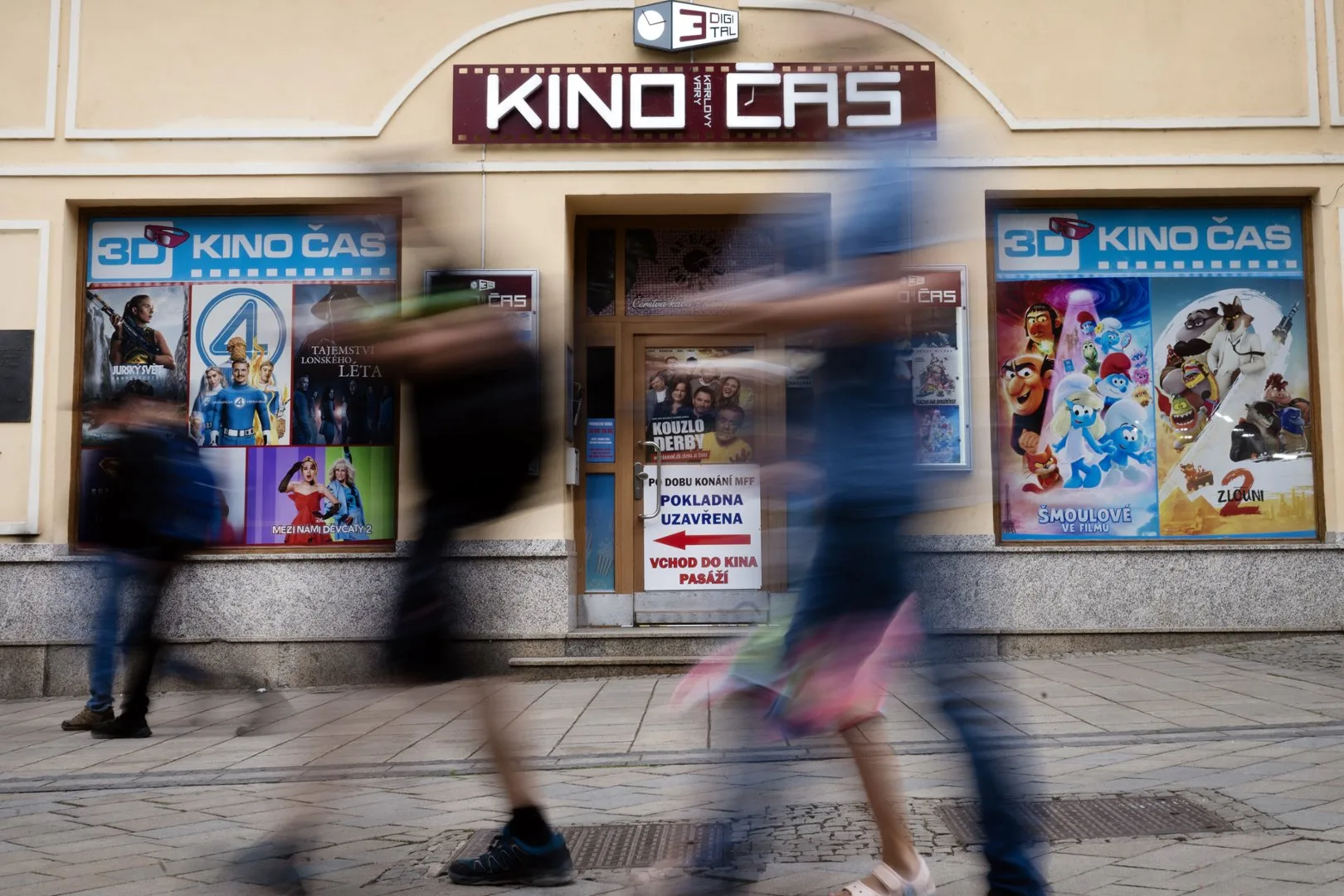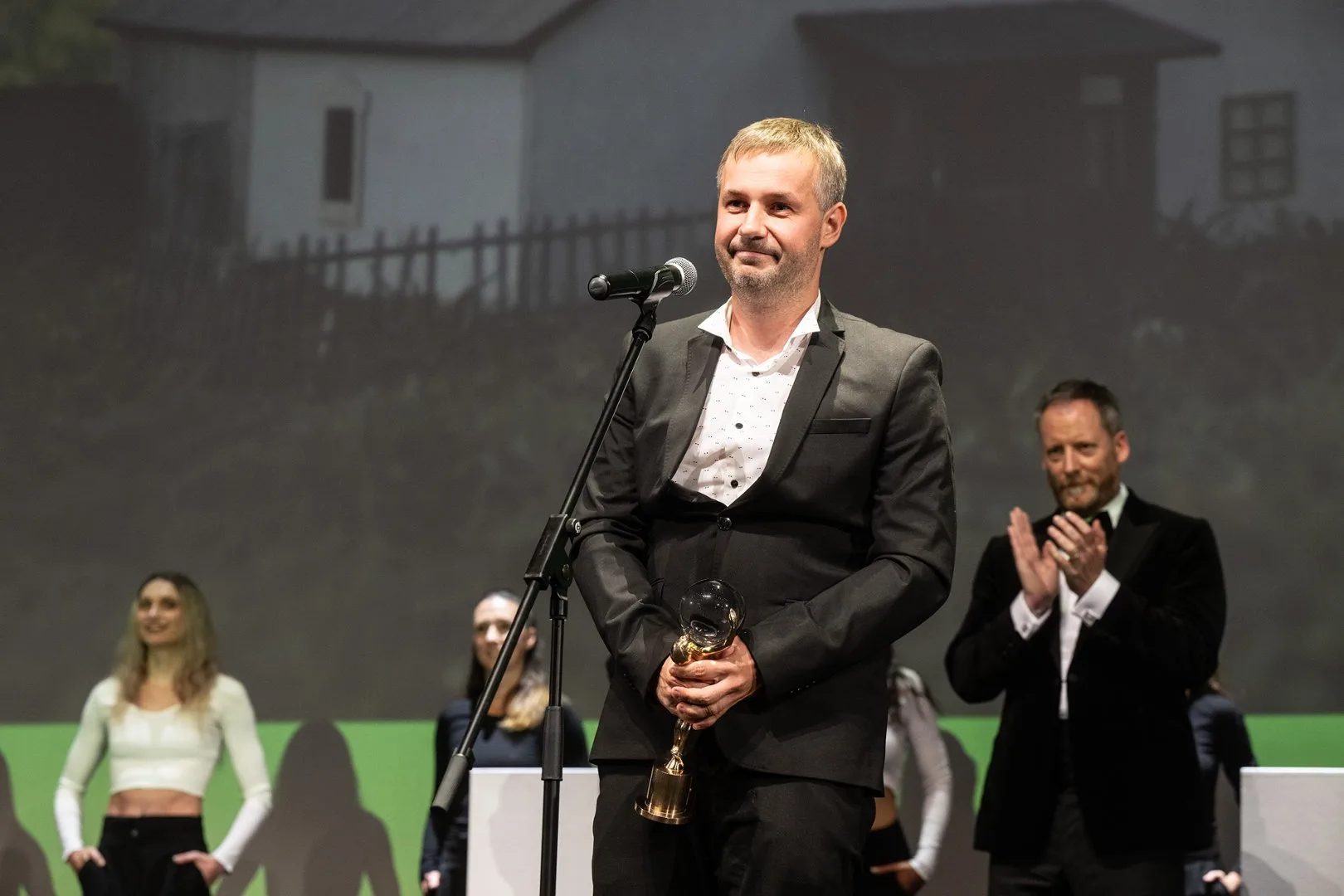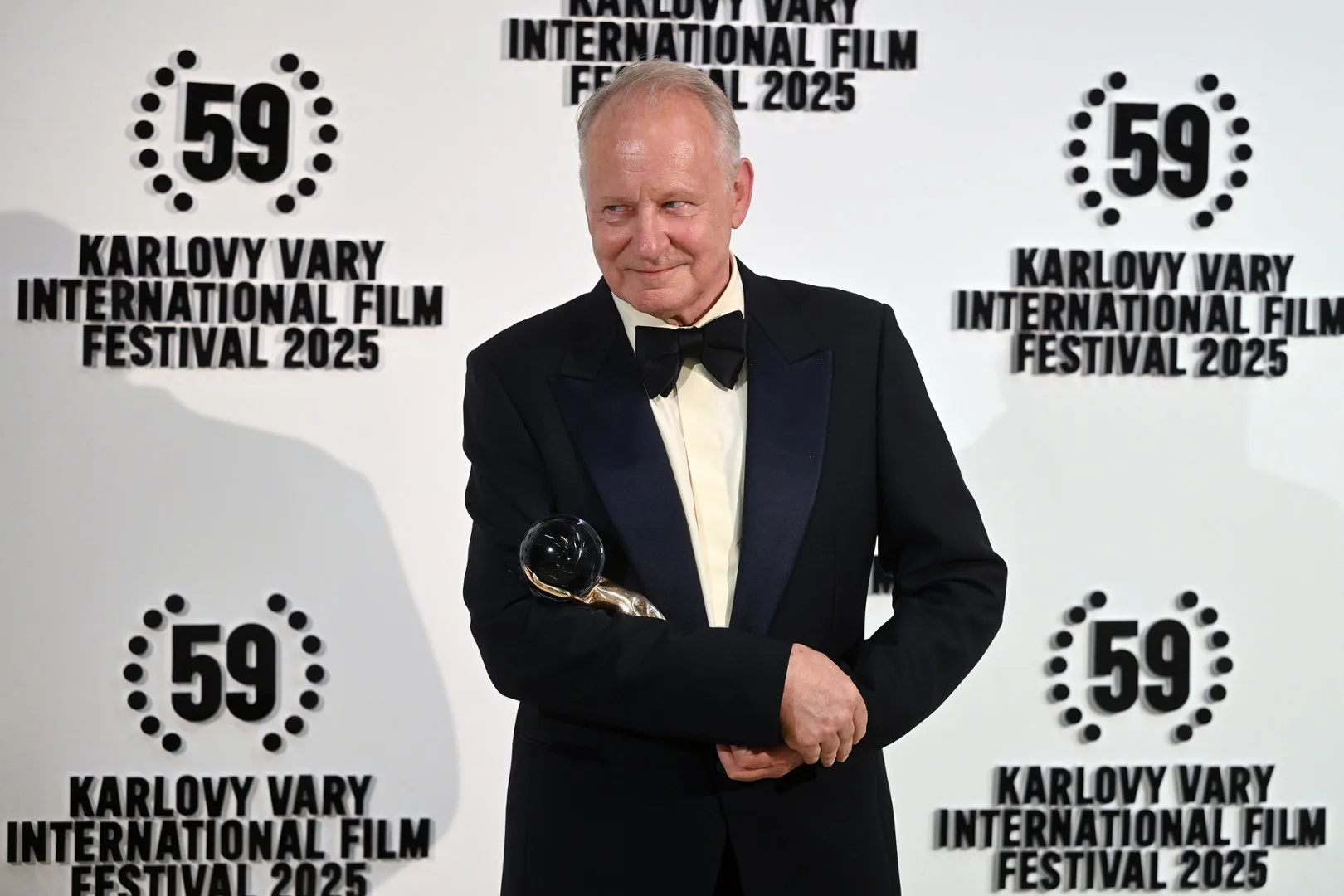Experiencing it for the primary time throughout its 59th version, the Karlovy Vary International Film Festival proved—at the least for this critic—each formidable and revitalizing. The identical may be stated for the easiest of the movies that screened all week lengthy on this scenic spa city within the Czech Republic. Nonetheless, there was ample vitality to be harnessed even outdoors of the films, from goings-on about city to Karlovy Fluctuate’s mix of awe-inspiring structure and pure splendor.
That hundreds of spectators descended every day on the historic metropolis centre, between pop-up tents and colonnades, by no means fairly disrupted the city’s idyllic qualities. Nonetheless, one can think about that Karlovy Fluctuate feels very totally different—much less vigorous, extra lulling—outdoors of the competition. Going to see movies every day between the Grandhotel Pupp and the Resort Thermal, strolling riverside beneath vibrant facades of assorted spas, eating places, and motels, I usually encountered teams of passerby queued as much as pattern mineral waters from the town’s springs, alongside others in line to safe free glasses of Prosecco or mugs of Pilsner Urquell that competition sponsors saved flowing. So ubiquitous is the latter round Prague that it’s cheaper right here to drink beer than bottled water.
Coinciding with the top of the college yr, the competition attracted an lively crowd of scholars from all through Europe, who see Karlovy Fluctuate as a perfect vacation spot to see movies, meet up with mates, and occasion round city—usually multi function night, which accounts for why an ambient buzz of exercise subsisted lengthy into the evening, each evening. Scores of younger attendees took benefit of this summer time environment and pitched campsites in a chosen “tent metropolis” space not removed from the promenade. Most of them spent extra time watching movies than sleeping underneath the open sky; the day breaks early in Karlovy Fluctuate, and birds had began singing by the point most of those cinephiles returned from late-night showtimes to recharge their batteries.
Every day, ticket places of work drew traces that stretched again a whole lot of meters; some slept in line to enhance their odds. Not the entire cinemas exhibiting movies round Karlovy Fluctuate are as sprawling because the 1131-seat Grand Corridor within the Resort Thermal; certainly, three venues in one other space of the lodge, which additionally host press screenings, all seat between 63 to 70, and the hillside Husovka Theatre, a brief climb away from the town centre, seats 96 adjoining to a comfortable outside bar. There’s an enthralling makeshift high quality to such venues, all of Karlovy Fluctuate making no matter modifications essential to amplify the communal enthusiasm for cinema that enlivens this competition.

At Karlovy Fluctuate, Celebrating Movie In All Its Varieties
As a newcomer to Karlovy Fluctuate, it was hanging to expertise pleasure on the bottom for movie in all kinds—not simply Cannes-premiered awards contenders, like Joachim Trier’s “Sentimental Worth” and Jafar Panahi’s “It Was Simply an Accident,” or starry retrospectives like “One Flew Over the Cuckoo’s Nest,” presented by producer Michael Douglas and co-producer Paul Zaentz on its 50th anniversary. Right here, boundary-pushing works within the Imagina part, from Mark Jenkin’s “I Noticed God’s Face within the Jet Path” to Ondřej Vavrečka’s “1+1+1” (on Tremendous 8 and 16mm, respectively), animated as many discussions as titles in Pragueshorts and the movies in Afterhours (a midnight part the place 4K restorations of “The Texas Chain-Noticed Bloodbath” and “Hellraiser” screened alongside the likes of “Harmful Animals”). Others informed me they’d been devoting their time to watching the works of American actor John Garfield, ten of which had been introduced in a competition sidebar. (“It’s a pure masterpiece,” one critic raved to me of “Physique and Soul,” a chiaroscuro boxing drama of bloody noses and punch-drunk fatalism that Garfield made with Robert Rossen.)
Over 130 movies screened through the competition, which has accrued a status as a “programmer’s competition” in that it brings collectively breakout titles from Cannes, Berlin, Sundance, Venice, and extra to showcase a veritable cream of the crop. For critics and film-industry professionals alike, it’s a useful alternative to catch up.
Outdoors of competitors titles reviewed within the earlier dispatches, I used to be most enthralled by “Desires (Intercourse Love),” the Golden Bear winner at Berlin this yr. From Norwegian director Dag Johan Haugerud, who has made two different movies that kind a thematic trilogy, this electrifying and elastic ode to the creative course of follows a young person whose hopeless crush on a instructor compels her to spill all the things she has skilled right into a novella. Together with her writing associated in voiceover narration, reality blurs with fiction, and the truth of what occurred is left as much as a rising variety of readers. Whereas others debate the character of the heartache she expresses in lyrical prose, “Desires” displays on the that means we create from reminiscences as we make artwork that turns them into one thing else fully.
From Ira Sachs, “Peter Hujar’s Day,” which I’d missed at Sundance, equally attracts seismic emotion from a monologue, because the famend photographer (Ben Whishaw) tells his pal, the journalist Linda Rosenkrantz (Rebecca Corridor), about the day past’s occasions. Mundane and contained although it was, Hujar’s remembrance of at some point in Nineteen Seventies New York turns into an exhumation of that point and place, the individuals who moved by it, and his personal position of their passage: observing, recounting, preserving.
One other sort of memorial is Akinola Davies’ debut “My Father’s Shadow,” which relives a day in Nineteen Nineties Lagos by the eyes of two younger brothers (Chibuike Marvellous Egbo, Godwin Egbo) lastly attending to know the daddy (Sope Dirisu) they’re about to lose; it’s a beautiful, mournful gesture of a movie, like a handprint that lingers on pores and skin, reflecting as “Aftersun” did on dynamics of absence and presence in all of the agonized, unfinished relationships we share with our fathers.
Hlynur Pálmason’s “The Love That Stays” equally sees filmmaking as sculpture, and time as its uncooked clay; working with instant environment, the Icelandic filmmaker solid his youngsters on this tragicomic portrait of a household coming aside, leading to a movie—shot piecemeal over years—that’s as loosely structured as it’s exactly composed, with a number of the strangest pictures wherever on the competition.

“Higher Go Mad within the Wild,” “Sand Metropolis” Triumph at Karlovy Fluctuate’s Awards Ceremony
Movies competing for the Crystal Globe premiered throughout the week, and the final word winner solely screened within the competition’s last days. As introduced through the competition’s Saturday-night closing ceremony, Slovak filmmaker Miro Remo’s charming docufiction hybrid “Better Go Mad in the Wild,” about two eccentrics of their sixties residing within the forests of Sumava, gained the part’s Grand Prix, changing into the primary homegrown title to earn prime honors on the fest in eight years.
Jurors Nicolas Celis, Babak Jalali, Jessica Kiang, Jiří Mádl and Tuva Novotny stated of their jury assertion that Remo’s “delightfully ingenious documentary” doubled as “a humorous valentine to the fading artwork of being true to your self,” including, “‘Higher Go Mad within the Wild’ seems like a gulp of contemporary, woody air, or a fast dip in an outside pond, or a second of contemplation as a cow chews in your beard. In brief, it seems like being free.” On stage, joked Remo, “If I knew it will be such an enormous occasion, I might have worn a bowtie.”
A particular jury prize, in the meantime, was awarded to “Bidad,” Soheil Beiraghi’s account of a Gen Z singer’s one-woman resistance to Iranian authority. “I thank Iranian ladies for not being afraid; they taught me to not be afraid,” he stated by a translator. “They don’t should be pitied — they should be applauded,” he added, prompting a standing ovation. In a shock twist, the jury break up their best-director prize between 33-year-old Lithuanian director Vytautas Katkus for “The Visitor” and 25-year-old French director Nathan Ambrosioni for “Out of Love,” honoring two movies “that characterize reverse ends of the spectrum in method but are every, individually, deeply spectacular directorial statements,” per their assertion.
Norwegian actress Pia Tjelta took house finest actress for “Don’t Call Me Mama,” about a teacher who has an affair with one of the refugees she mentors at a local asylum centre, whereas Spanish actor Àlex Brendemühl gained finest actor for “When a River Turns into the Sea,” by which he performs the stoic father of a girl recovering from sexual assault. A particular jury point out was awarded to Czech newcomer Kateřina Falbrová, who was first cast in “Broken Voices” at age 12, in the role of a singer preyed upon by her choirmaster. Lastly, the Právo Viewers Award went to “We’ve Got to Frame It! (a conversation with Jiří Bartoška in July 2021),” the festival’s opening title.
Jurors for the Proxima sidebar part included Yulia Evina Bhara, Noaz Deshe, Nelson Carlos De Los Santos Arias and Marissa Frobes. In Proxima, the Grand Prix winner was “Sand City,” a visually striking tone poem set in the city of Dhaka, by first-time Bangladeshi feature filmmaker Mahde Hasan, whereas the particular jury prize was awarded to “Forensics,” by Federico Atehortúa Arteaga, which uncovers connections between tales of the disappeared in Colombia. Particular point out was awarded to Manoël Dupont’s “Earlier than / After,” from Belgium, about two males who bond over their receding hairlines whereas touring to Istanbul to go to a hair-transplant clinic there.
On the ceremony, Stellan Skarsgård—star of “Sentimental Value,” which he discussed with RogerEbert.com—was additionally introduced with the Crystal Globe for Excellent Contribution to World Cinema. “I’m not lifeless but,” he joked on stage. “I assumed I used to be too younger for this.” One other milestone second got here because the competition bestowed a KVIFF President’s Award on the legendary Czech editor Jiří Brožek—its first such recognition for an editor. Earlier within the week, the competition had him introduce a screening of Karel Kachyňa’s “The Demise of the Lovely Deer,” a Czech basic, within the historic Karlovy Fluctuate Theatre.

Dancing with Ghosts, as KVIFF Involves a Shut
After one last screening of Jay Duplass comedy “The Baltimorons,” the closing-night occasion obtained going an hour earlier than midnight, because the halls of the Grandhotel Pupp become a free-for-all of meals, drink, and festivity. Members of the juries, sworn to secrecy throughout deliberations, might lastly reduce unfastened amid a sea of stars. A downstairs dancefloor on the intimate Bechers Bar—a late-night VIP hang-out all through the week, although all of its tables had been completely reserved this yr for sponsors who largely left them unoccupied, making for a curious visible most nights of the competition—crammed up because the evening went on, reaching peak capability round 4 within the morning.
Empty chairs at empty tables, in one other context, mirrored Karlovy Fluctuate’s overarching tribute to Jirí Bartoska, its late president, whose demise in Might hung heavy over the competition. Since 2008, KVIFF screenings have all been prefaced by cinematic trailers that includes previous laureates of the competition’s main awards. Czech actor Bolek Polívka appeared on this yr’s movie, by which Polívka—a long-time pal of Bartoska—sits at a desk in a bar and orders whiskeys for himself and an unseen acquaintance. Because the digital camera turns, the viewers realizes no person is sitting throughout from him, and that Polívka is addressing the late Bartoska, sliding {a photograph} of the actor throughout the desk and telling him, “to hold it up someplace, there.” On the closing-night ceremony, Bartoska’s remembrance was met with sustained applause; many had been seen wiping away tears.
In a tragic flip of occasions, hours after “Higher Go Mad within the Wild” gained the Grand Prix—Crystal Globe in Karlovy Fluctuate, one of its two subjects—Czech poet František Klišík—was found dead in a pond in the Czech village of Ohrobec, where he’d been celebrating the film’s success. Klišík’s demise continues to be underneath investigation, however phrase of his sudden passing at 62 reached Remo as he returned house the following day, nonetheless buzzing from victory. In a public statement addressed to Klišík, a grief-stricken Remo turned to his topic’s phrases, from one of many poems that featured of their movie: “Life is a momentary phantasm, a cry into silence, a silly effort, a cup compelled upon you, a sip of scrumptious style, a prerequisite for demise, which then is our certainty, a prerequisite for all times.”
It’s exhausting to know what to say a couple of celebration like Karlovy Fluctuate concluding with such stark and successive notes of legacy and loss, aside from that reminders had been in all places this week of the position cinema performs in serving to us make sense of mortality. At its finest, the projector’s flickering gentle can immortalize; its footage of ghosts make the previous current as soon as extra. Paying tribute to a late luminary who made the competition what it’s as we speak, Karlovy Fluctuate regarded again whilst programmers skilled their gaze ahead, making for a headlong rush of a competition by which it was nonetheless straightforward to really feel suspended in time: savoring each second on the finish of 1 period, caught between gratitude and heartbreak on the onset of one other.


